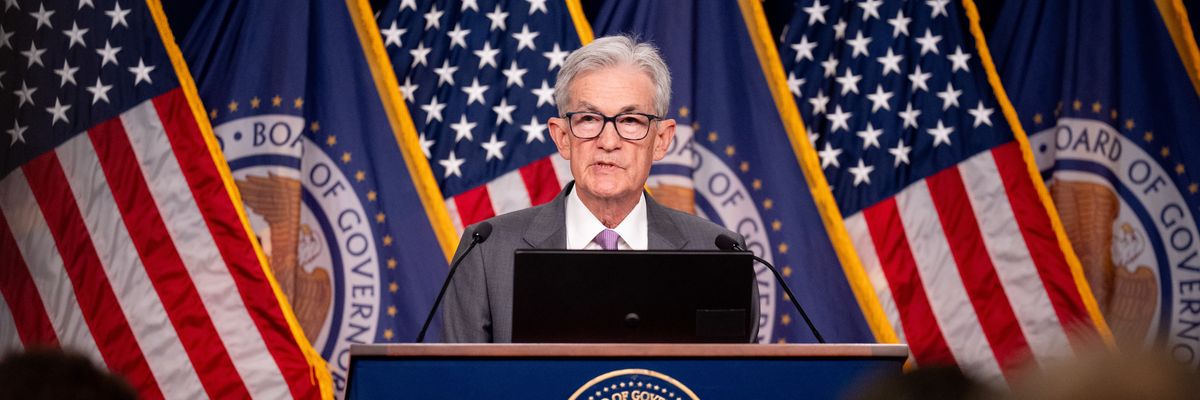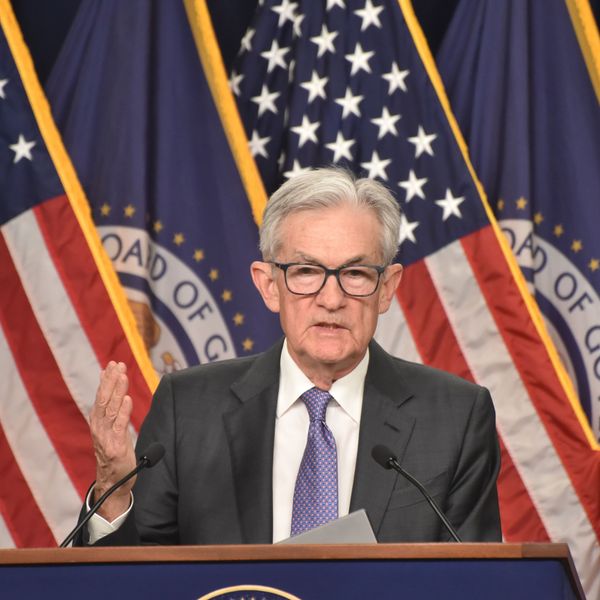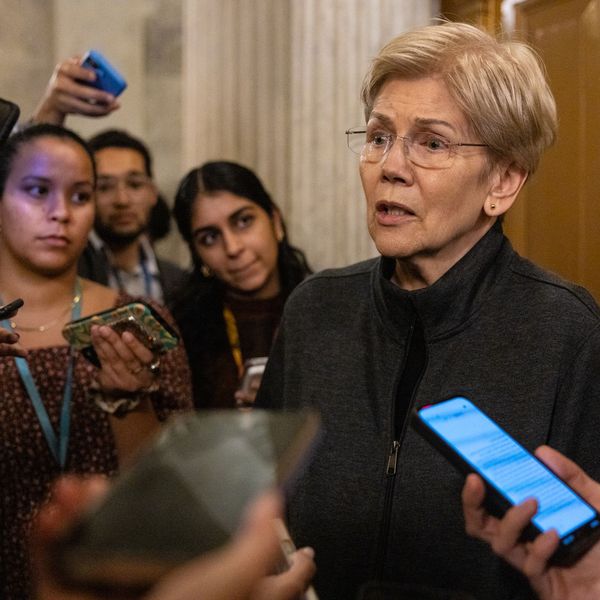
Federal Reserve Chair Jerome Powell speaks at a news conference on July 31, 2024 in Washington, D.C.
Warren Tells Fed Chair Powell to 'Cancel His Summer Vacation' and Cut Rates Now
"He's been warned over and over again that waiting too long risks driving the economy into a ditch," said Sen. Elizabeth Warren. "The jobs data is flashing red."
U.S. Sen. Elizabeth Warren on Friday demanded that the chairman of the Federal Reserve immediately "cancel his summer vacation" and slash interest rates following the release of government data showing weaker-than-expected job growth and an increase in the unemployment rate last month.
Warren (D-Mass.), an outspoken critic of the Fed's aggressive interest rate increases, argued in a social media post that Fed Chair Jerome Powell "made a serious mistake not cutting interest rates" at the Federal Open Market Committee's (FOMC) meeting earlier this week. The central bank's policy-setting group opted to hold rates at 5.25% to 5.5% for the 12th consecutive month.
The FOMC's next scheduled meeting isn't until September 17.
"The jobs data is flashing red," the senator wrote. "Powell needs to cancel his summer vacation and cut rates now—not wait six weeks."
The U.S. Labor Department said Friday that employers added 114,000 jobs in July, the lowest number since April. Economists projected 175,000 new jobs.
"Today's report shows the Fed erred in postponing rate cuts to September," said Bilal Baydoun, director of policy and research at the Groundwork Collaborative. "A recession is not inevitable, but it is solely in the hands of the Fed to deliver a major rate cut immediately. Workers should not have to pay the price for the Fed's failure to follow the data."
"Powell's delay is hurting millions of Americans and raising the risks of a recession. The only person it may help is Trump."
The jobs data came two days after Powell said a September rate cut is "on the table" but declined to commit to reducing borrowing costs, even though inflation has cooled dramatically since its peak in June 2022 and higher interest rates have hammered lower-income Americans. Warren and other Democratic lawmakers have also blamed Fed policy for worsening the nation's housing crisis.
Elise Gould, a senior economist at the Economic Policy Institute, argued the new jobs data "suggests the Fed has waited too long to lower interest rates."
"More people entered the labor market in search of jobs, but many haven't found them," Gould wrote. "Nominal wage growth continues to edge down, falling to 3.6% year over year, its lowest in two years. While more recent comparisons are more volatile, the deceleration is clear across all measures. There is no evidence of inflationary pressures coming from the labor market."
The Fed's refusal to cut interest rates in the face of mounting evidence that a reduction is warranted—and potentially necessary to avert a recession—has raised concerns that Powell is succumbing to political pressure from Republican presidential nominee Donald Trump, who has warned the central bank chief against cutting rates before the November election.
Trump initially nominated Powell to serve as Fed chair in 2017, and President Joe Biden renominated him for another four-year term in 2021.
In an interview last month, Trump said that if he's elected to another four years in the White House in November, he would let Powell serve the rest of his term, "especially if I thought he was doing the right thing."
Powell insisted at a press conference Wednesday that "we don't change anything in our approach to address other factors, like the political calendar."
JPMorgan Chase, the largest bank in the U.S., is forecasting a half-point rate cut in both September and November. The FOMC's November meeting is scheduled to begin a day after the presidential election.
While Trump and Republicans in Congress have attempted to characterize any pre-election rate cuts as politically motivated, Democratic lawmakers and watchdogs have argued that refusing to cut rates amid overwhelming evidence in favor would itself be a political decision—one that could help the former president win the 2024 race.
"The Fed should have already cut rates!" the Revolving Door Project, an anti-corruption group, wrote on social media Friday. "Powell's delay is hurting millions of Americans and raising the risks of a recession. The only person it may help is Trump."
"Powell's maintenance of a high interest rate environment improves Trump's 2024 electoral prospects—and a victory for Trump would be a death knell for democracy and the climate," the group added.
An Urgent Message From Our Co-Founder
Dear Common Dreams reader, The U.S. is on a fast track to authoritarianism like nothing I've ever seen. Meanwhile, corporate news outlets are utterly capitulating to Trump, twisting their coverage to avoid drawing his ire while lining up to stuff cash in his pockets. That's why I believe that Common Dreams is doing the best and most consequential reporting that we've ever done. Our small but mighty team is a progressive reporting powerhouse, covering the news every day that the corporate media never will. Our mission has always been simple: To inform. To inspire. And to ignite change for the common good. Now here's the key piece that I want all our readers to understand: None of this would be possible without your financial support. That's not just some fundraising cliche. It's the absolute and literal truth. We don't accept corporate advertising and never will. We don't have a paywall because we don't think people should be blocked from critical news based on their ability to pay. Everything we do is funded by the donations of readers like you. Will you donate now to help power the nonprofit, independent reporting of Common Dreams? Thank you for being a vital member of our community. Together, we can keep independent journalism alive when it’s needed most. - Craig Brown, Co-founder |
U.S. Sen. Elizabeth Warren on Friday demanded that the chairman of the Federal Reserve immediately "cancel his summer vacation" and slash interest rates following the release of government data showing weaker-than-expected job growth and an increase in the unemployment rate last month.
Warren (D-Mass.), an outspoken critic of the Fed's aggressive interest rate increases, argued in a social media post that Fed Chair Jerome Powell "made a serious mistake not cutting interest rates" at the Federal Open Market Committee's (FOMC) meeting earlier this week. The central bank's policy-setting group opted to hold rates at 5.25% to 5.5% for the 12th consecutive month.
The FOMC's next scheduled meeting isn't until September 17.
"The jobs data is flashing red," the senator wrote. "Powell needs to cancel his summer vacation and cut rates now—not wait six weeks."
The U.S. Labor Department said Friday that employers added 114,000 jobs in July, the lowest number since April. Economists projected 175,000 new jobs.
"Today's report shows the Fed erred in postponing rate cuts to September," said Bilal Baydoun, director of policy and research at the Groundwork Collaborative. "A recession is not inevitable, but it is solely in the hands of the Fed to deliver a major rate cut immediately. Workers should not have to pay the price for the Fed's failure to follow the data."
"Powell's delay is hurting millions of Americans and raising the risks of a recession. The only person it may help is Trump."
The jobs data came two days after Powell said a September rate cut is "on the table" but declined to commit to reducing borrowing costs, even though inflation has cooled dramatically since its peak in June 2022 and higher interest rates have hammered lower-income Americans. Warren and other Democratic lawmakers have also blamed Fed policy for worsening the nation's housing crisis.
Elise Gould, a senior economist at the Economic Policy Institute, argued the new jobs data "suggests the Fed has waited too long to lower interest rates."
"More people entered the labor market in search of jobs, but many haven't found them," Gould wrote. "Nominal wage growth continues to edge down, falling to 3.6% year over year, its lowest in two years. While more recent comparisons are more volatile, the deceleration is clear across all measures. There is no evidence of inflationary pressures coming from the labor market."
The Fed's refusal to cut interest rates in the face of mounting evidence that a reduction is warranted—and potentially necessary to avert a recession—has raised concerns that Powell is succumbing to political pressure from Republican presidential nominee Donald Trump, who has warned the central bank chief against cutting rates before the November election.
Trump initially nominated Powell to serve as Fed chair in 2017, and President Joe Biden renominated him for another four-year term in 2021.
In an interview last month, Trump said that if he's elected to another four years in the White House in November, he would let Powell serve the rest of his term, "especially if I thought he was doing the right thing."
Powell insisted at a press conference Wednesday that "we don't change anything in our approach to address other factors, like the political calendar."
JPMorgan Chase, the largest bank in the U.S., is forecasting a half-point rate cut in both September and November. The FOMC's November meeting is scheduled to begin a day after the presidential election.
While Trump and Republicans in Congress have attempted to characterize any pre-election rate cuts as politically motivated, Democratic lawmakers and watchdogs have argued that refusing to cut rates amid overwhelming evidence in favor would itself be a political decision—one that could help the former president win the 2024 race.
"The Fed should have already cut rates!" the Revolving Door Project, an anti-corruption group, wrote on social media Friday. "Powell's delay is hurting millions of Americans and raising the risks of a recession. The only person it may help is Trump."
"Powell's maintenance of a high interest rate environment improves Trump's 2024 electoral prospects—and a victory for Trump would be a death knell for democracy and the climate," the group added.
U.S. Sen. Elizabeth Warren on Friday demanded that the chairman of the Federal Reserve immediately "cancel his summer vacation" and slash interest rates following the release of government data showing weaker-than-expected job growth and an increase in the unemployment rate last month.
Warren (D-Mass.), an outspoken critic of the Fed's aggressive interest rate increases, argued in a social media post that Fed Chair Jerome Powell "made a serious mistake not cutting interest rates" at the Federal Open Market Committee's (FOMC) meeting earlier this week. The central bank's policy-setting group opted to hold rates at 5.25% to 5.5% for the 12th consecutive month.
The FOMC's next scheduled meeting isn't until September 17.
"The jobs data is flashing red," the senator wrote. "Powell needs to cancel his summer vacation and cut rates now—not wait six weeks."
The U.S. Labor Department said Friday that employers added 114,000 jobs in July, the lowest number since April. Economists projected 175,000 new jobs.
"Today's report shows the Fed erred in postponing rate cuts to September," said Bilal Baydoun, director of policy and research at the Groundwork Collaborative. "A recession is not inevitable, but it is solely in the hands of the Fed to deliver a major rate cut immediately. Workers should not have to pay the price for the Fed's failure to follow the data."
"Powell's delay is hurting millions of Americans and raising the risks of a recession. The only person it may help is Trump."
The jobs data came two days after Powell said a September rate cut is "on the table" but declined to commit to reducing borrowing costs, even though inflation has cooled dramatically since its peak in June 2022 and higher interest rates have hammered lower-income Americans. Warren and other Democratic lawmakers have also blamed Fed policy for worsening the nation's housing crisis.
Elise Gould, a senior economist at the Economic Policy Institute, argued the new jobs data "suggests the Fed has waited too long to lower interest rates."
"More people entered the labor market in search of jobs, but many haven't found them," Gould wrote. "Nominal wage growth continues to edge down, falling to 3.6% year over year, its lowest in two years. While more recent comparisons are more volatile, the deceleration is clear across all measures. There is no evidence of inflationary pressures coming from the labor market."
The Fed's refusal to cut interest rates in the face of mounting evidence that a reduction is warranted—and potentially necessary to avert a recession—has raised concerns that Powell is succumbing to political pressure from Republican presidential nominee Donald Trump, who has warned the central bank chief against cutting rates before the November election.
Trump initially nominated Powell to serve as Fed chair in 2017, and President Joe Biden renominated him for another four-year term in 2021.
In an interview last month, Trump said that if he's elected to another four years in the White House in November, he would let Powell serve the rest of his term, "especially if I thought he was doing the right thing."
Powell insisted at a press conference Wednesday that "we don't change anything in our approach to address other factors, like the political calendar."
JPMorgan Chase, the largest bank in the U.S., is forecasting a half-point rate cut in both September and November. The FOMC's November meeting is scheduled to begin a day after the presidential election.
While Trump and Republicans in Congress have attempted to characterize any pre-election rate cuts as politically motivated, Democratic lawmakers and watchdogs have argued that refusing to cut rates amid overwhelming evidence in favor would itself be a political decision—one that could help the former president win the 2024 race.
"The Fed should have already cut rates!" the Revolving Door Project, an anti-corruption group, wrote on social media Friday. "Powell's delay is hurting millions of Americans and raising the risks of a recession. The only person it may help is Trump."
"Powell's maintenance of a high interest rate environment improves Trump's 2024 electoral prospects—and a victory for Trump would be a death knell for democracy and the climate," the group added.

